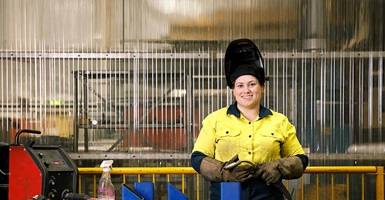Each year around 500 million pathology tests are conducted across Australia, playing a role in more than 70 per cent of medical diagnoses and helping doctors to make decisions as to how they treat their patients.
On the front line of this process are pathology collectors, who take blood or other samples, label them and prepare them to be sent to laboratories for analysis.
Here’s what you need to know about a career as a pathology collector:
Why choose pathology collection?
Pathology is a part of the fast growing health sector, with a workforce of around 24,000 people across the country. Tests are used not only for diagnosing conditions but also for screening for diseases, classifying future risk of disease and for health checks.
Chisholm pathology teacher Sharon Baldwin says it’s a job that is very rewarding, especially knowing you’re making a difference in people’s lives by helping them to find answers to their health problems.
“It’s especially rewarding when you’re able to reassure someone who is nervous about testing and provide them with a caring and professional experience that will make them confident for future pathology visits,” she says.
What do pathology collectors do?
As a pathology collector you’ll most likely work in a hospital or a suburban collection centre. You might even travel to the homes of those who are housebound.
You’ll perform a number of roles including extracting, collecting and labelling blood, urine, faeces, swabs and other patient samples. You’ll need to follow infection prevention and control procedures and label and prepare samples for couriers to deliver to the lab.
What attributes do pathology collectors need?
Pathology collectors must have good communication skills and the patience and empathy to be able to work directly with patients.
You’ll also need an ability to focus and demonstrate attention to detail as accurately documenting and labelling samples is absolutely essential to the role.
Pathology collectors generally also need to be flexible with work hours, have the ability to work autonomously and within a team, and be able to problem-solve. You should also be committed to further professional development.
What are the challenges?
Sharon says it can be challenging working in a fast-paced pathology environment while also facing pressure to remain people-focussed.
“Other challenges include working with diverse clients, remaining current and well-skilled and being able to respond well to constructive criticism or feedback,” she says. “That said, it’s fantastic meeting new people every day, working as part of a pathology team and learning about the health sector.”
Pathology collection courses
The Certificate III in Pathology Collection will give you a good understanding of how to collect and process pathology specimens.
“We focus not only technique but how to give accurate patient instructions on how to self-collect samples,” Sharon says. “We also teach the correct methods for transporting and storing specimens which helps maintain their integrity until testing is performed in the labs.”
You’ll also learn infection control, first aid and work health safety principles. Students will have the opportunity to perform “live bleeds” (drawing blood from a patient) both during class and during work placement, ensuring students gain real-life experience and are confident on the job. Sharon says they also learn the technique of performing swabs, including throat and nose swabs.
The course not only has the potential to lead to work as a pathology collector, but could also lead to a job as a pathology receptionist or a laboratory assistant.
“Another benefit of this course is that students can use it as a pathway into nursing which we strongly support. After a few years working within the pathology industry there are also opportunities to become a teacher within the VET sector,” Sharon says.
Pathology collector job opportunities
According to the Australian Government’s Job Outlook, strong future jobs growth is predicted for pathology collectors in the next five years.
Sharon says pathology collection is a good choice for those looking for flexibility as many positions are part-time or casual. She recommends those looking for work to keep an eye on the websites of the major pathology companies. “Some of our students are picked up by pathology companies while completing their work placement.”
Ultimately, pathology is an essential medical service that’s needed right across Australia, so it can be a stable career choice.
“As there’s always a need for medical testing and diagnostics, there will always be a need for people to work as pathology collectors, whether that’s in a hospital, clinic or in a collection centre,” Sharon says.


